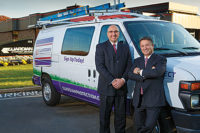
As consumers become more and more aware of environmental issues, they are becoming increasingly interested in the idea of “green” living or minimizing the impact of their lifestyles on the environment, also known as their “carbon footprint.” Some security dealers are tapping into this trend by marketing lighting control, automatic shade control, HVAC controls, and other home automation systems that help conserve energy. Some security dealers are even branching into installing solar panels.
HVAC & LIGHTING CONTROL
Although the percentage of customers interested in being green is still relatively small, it is growing, security dealers interviewed for this article agree. “More and more people are interested for different reasons,” comments David Young, president of Chesterfield, Mo.-based dealer The Sound Room. “Some just want to do the right thing. Others are looking for a payback. In the mainstream, people will decide based on payback.”
That payback typically takes the form of savings on the customer’s energy bill - and as Young notes, the largest and second largest sources of energy consumption in a typical home are the heating, ventilation and air conditioning (HVAC) system and lighting. Security dealers can offer customers options to help reduce energy consumption in both of those areas.
Home automation systems can help reduce energy costs by making it easier for homeowners to adjust the heating or cooling in their homes, or only in certain rooms, when they are not occupied. Solutions that provide “scene” capability can do this by, for example, establishing an evening scene for when everyone is downstairs watching television. In response to a single touch from a home occupant, the evening scene setting would automatically adjust heating and air conditioning in all upstairs rooms to conserve energy. If lighting control also were part of the system, the evening scene could automatically shut off upstairs lights.
Dealers that install light controls typically program them with an option that can save energy even when lights are in use. “The human eye can’t tell the difference between full brightness and 90 percent brightness on an incandescent bulb,” explains Jay Francis, president of McKinney Smart Homes of McKinney, Texas. But by setting the lighting control system to run all lighting at 90 percent brightness, homeowners can save significantly on energy costs.
Chad Nichols, chief technology officer for Cornerstone Technologies, a Florence, Ky.-based dealer, says clients can save as much as 25 percent or more on their energy costs if they have both lighting and HVAC control.
Another element of home automation that can help reduce energy costs is automatic shade control. These systems offer single-touch control of multiple window shades, making it easier - and therefore more likely - that a customer will adjust the shades to keep the sun out of a room or to let it into the room at the appropriate times, thereby minimizing heating and air conditioning usage. For the ultimate energy savings, homeowners can connect the shades to an astronomical clock that knows exact sunrise and sunset times at their home’s latitude and longitude throughout the year and automatically adjusts the shades accordingly.
A home’s alarm system also can play an important role in minimizing energy usage if it is tied in with the home control system. “Security systems provide a tremendous amount of information about a home,” comments Evan Marty, chief technology officer of Paragon Technologies Group, in Aspen, Colo.
The system can be set up so that, for example, when occupants leave the home, arming it in the “away” mode, all or most of the lighting is extinguished and HVAC system automatically adjusts to energy-saving settings. And Paragon Technology Group offers a system that adjusts settings and
lowers all shades if a home is left in the armed mode for more than four days.
Motion detectors also can play an important role in reducing energy usage by acting as occupancy sensors, automatically extinguishing lights and adjusting the HVAC system when there is no activity in a room. Dealers have mixed feelings about this option, however.
“If you stay still, the lights go out on you,” complains Corey Prevost, president of Roswell, Ga.-based Innovative Home Systems. Prevost doesn’t like to use occupancy sensors for that reason - and because different family members often have different opinions about how the sensors should be programmed, making it virtually impossible to make everyone happy.
But The Sound Room often recommends occupancy sensors. Young says the company uses equipment that has a delay feature built in, minimizing the likelihood that the lights will go out while a person is standing still in the room.
ENERGY MANAGEMENT SYSTEMS
Homeowners can do a better job of saving energy if they have a better understanding of how it is being used. Recognizing that, some dealers offer solutions that monitor energy usage.
The Sound Room sells a system that monitors energy usage collected via wires attached to each circuit breaker in a home. The data feeds into a processor with a network connection, enabling homeowners to use their personal computers to see how much energy they are using on a circuit-breaker by circuit-breaker basis. Each circuit-breaker zone can be labeled to easily identify it.
Prevost, who installs energy monitoring solutions, says that it also can have a security function - for example, alerting the owner of a vacation home if too much energy is used during a period when the home is supposed to be unoccupied.
SOLAR PANELS
Some dealers help homeowners become even greener by installing solar panels. For most clients it’s too expensive to go all-solar but more and more homeowners are reducing their energy costs by generating some of their own power.
Erdmann Electric of Springville, Utah first began installing solar panels in the 1980s for homes located in ultra rural areas where traditional forms of power were unavailable, making them totally “off the grid.” These clients lived in a way many Americans would be reluctant to, starting a
generator to do a load of laundry, recalls Erdmann Electric owner, Ken Erdmann.
Today most of Erdmann’s clients are considerably more upscale, using solar to minimize but not eliminate their reliance on grid power sources. Some also use their connection to the grid to sell the power they generate to the power companies during periods they are not using it.
Erdmann cautions, however, that only licensed electricians are allowed to connect solar systems to the grid in that manner - a requirement that’s not a problem for his company, which has licensed electricians on staff.
The company gets a lot of business through word of mouth. “Many of our clients have like-minded friends,” he says.
The Sound Room is a more recent entrant in the solar market, having installed solar panels for just a few years. But the company is taking the opportunity very seriously and soon plans to create a separate business unit with its own name and its own staff.
Typical clients replace about a third of their normal energy consumption by using solar and most of them see a payback on their investment within five to six years, Young says. He notes, however, that payback times vary depending on a specific client’s installation, energy usage, climate conditions and tax laws.
In preparation for entering the solar business, The Sound Room sent people for training from a key manufacturer. The company also established relationships with structural engineers, who are often called in to determine if a home’s roof is strong enough to support solar panels.
Before doing an installation for a customer, the company does a site survey using specialized measurement tools to determine solar efficiency. Based on that and other data, the company produces a 28-page report that shows the client’s return on investment based on different usage levels.
When the system is installed, The Sound Room can integrate it with an energy management system so that clients can see not only how much power they’re consuming but also how much they are generating.
Young cautions that, “It’s better to conserve energy than to generate it — if you can conserve a watt, that will cost a third less than it would to generate that same watt.”
LEEDS Certification
People building new homes have the greatest flexibility in designing green features into their homes. To help them achieve that, the U.S. Green Building Council created the LEEDS certification program, which provides design and construction guidelines to help minimize a home’s carbon footprint. Some of those guidelines specify capabilities that security dealers can play a role in implementing.
Several levels of LEEDS certification are available. The strictest, or most eco-conscious, of these is platinum level certification.
MCC Smart Homes, a Point Pleasant, N.J.-based dealer, is installing a range of capabilities to support an upscale 7,000 square foot New Jersey home that is targeted for LEEDS platinum certification.
The home’s automation system will have 149 zones. Every door and window will be hardwired so that if a window is left open, the air conditioning in that room will automatically adjust. Motion detectors in all the hallways and stairwells will provide light control. Ninety-two motorized blinds controlled by an astronomical clock will let heat in and out.
In addition, every room will have an occupancy sensor. The ones in the bathrooms will turn off the re-circulation loop for the hot water when no one is in the room.
“We will monitor almost everything in the house,” notes John Morra, president of MCC Smart Homes.
For example, a sensor will let the homeowner know if the barrels that collect rainwater for washing and bathing are getting low.
The house also will have 43 solar panels. “They’re aiming to take it completely off the grid,” Morra says.
More information about LEEDS certification is available at www.usgbc.org.
A Useful Solar Panel Installer Association
Security dealers that are getting serious about the solar panel business should consider joining the American Renewable Energy Advocate Society.
“It’s a huge networking opportunity,” notes Eric Denissen, who is owner of Monument. Colo.-based security and solar panel dealer The Ridgeline Group as well as an AREAS founding member.
AREAS has three facets, Denissen explains. These include helping students who have studied solar panel engineering and installation find work in the field, as well as helping companies that want to get into the solar panel installation business. In addition, AREAS works with organizations such as Habitat for Humanity and Easter Seals to help install solar panels for disadvantaged people who can then save substantially on their energy costs.
The Ridgeline Group frequently draws upon AREAS members and resources. “It’s a pool to pull from,” Dennisen says.
Dennisen also advises companies that are serious about solar to become affiliated with the North American Board of Certified Energy Practitioners (NABCEP).


